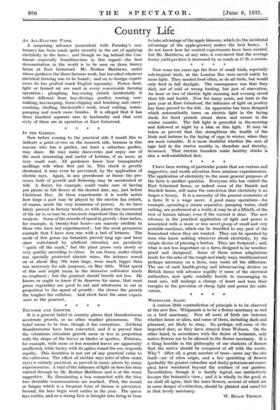IN THE GARDEN.
Now before coming to the practical side I would like to indicate a point or two on the research side, because in this anyone who has a garden, not least a suburban garden, may share. He may make discoveries and enjoy one of the most interesting and useful of hobbies, if no more, at very small cost. All gardeners know how transplanted seedlings wilt when first put in. This check is greatly shortened, it may even be prevented, by the application of electric rays. Again, in any greenhouse or frame the pro- cesses both of growth and flowering may be accelerated at will. A florist, for example, could make sure of having pot plants in full flower at the desired date, say, just before Christmas Day. In these experiments it is worth notice how large a part may be played by the electric fan (which, of course, needs the very minimum of power). As we have lately proved in factory works, so with plants the movement of the air is, or may be, even more important than its chemical analysis. Some of the records of speed in growth—four inches, for example, in twenty-four hours—are scarcely credible to those who have not experimented ; but the most persuasive example that I have seen was with a bed of lettuces. The seeds of this genus (as botanists proved long ago and have since corrobated by artificial stimulus) are peculiarly " quick off the mark," but the plant grows very slowly or very quickly according to clime. In one frame, under which run specially protected electric wires, the lettuces sowed on or about May 7th were huge,. were much bigger than was necessary for sale purposes, on May 28th. What speed of this sort might mean to the intensive cultivator needs no emphasis ; but the gourmet should benefit not less. He knows or ought to know if he deserves his name, that most green vegetables are good to eat and wholesome to eat in proportion to the speed of growth : the slower the growth the tougher the cellulose. And stock have the same experi- ence as the gourmet.






































 Previous page
Previous page